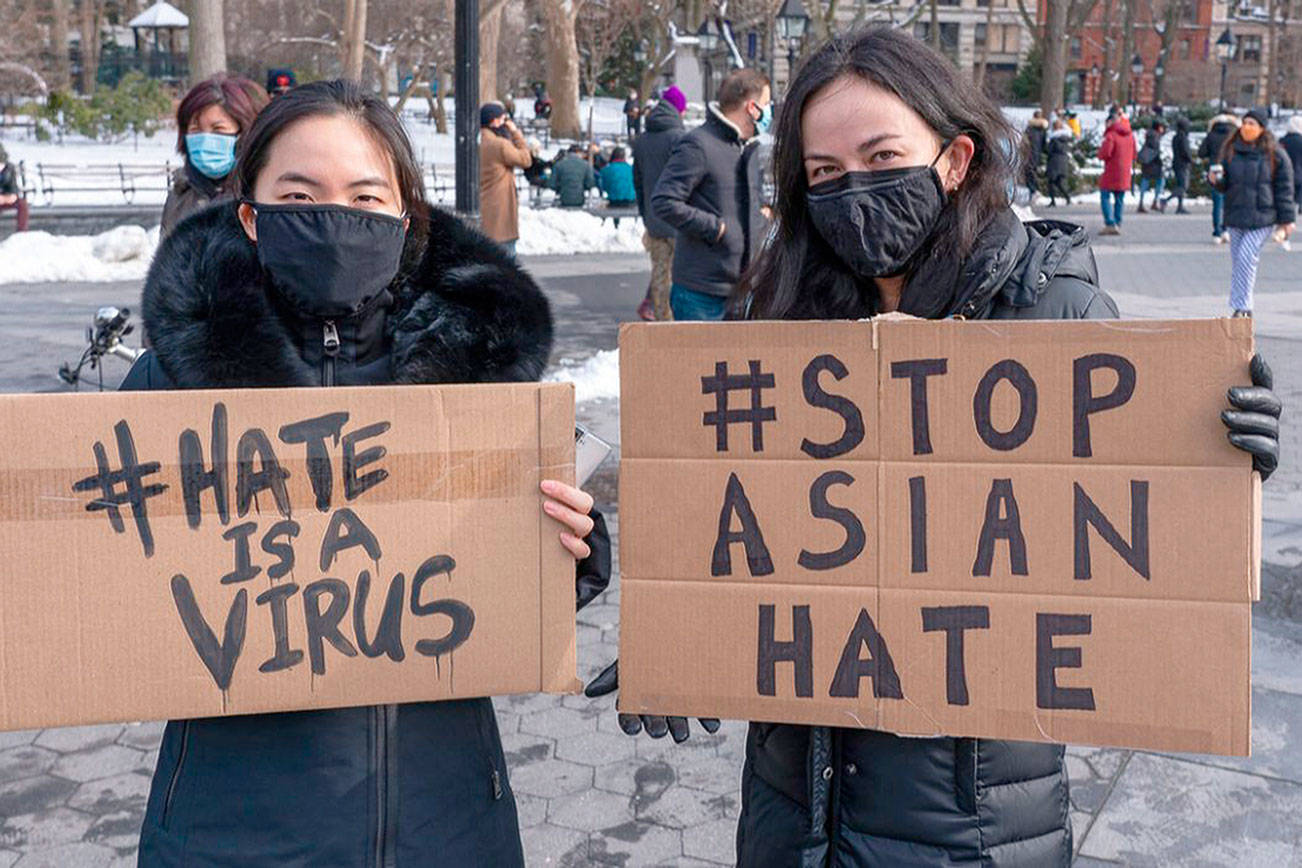Kitsap County has not experienced an increase in hate crimes against Asian Americans that Seattle and other communities across the nation have experienced since the start of the COVID-19 pandemic, local law enforcement agencies say.
Anti-Asian hate crimes in 16 of American’s largest cities increased 149% in 2020, according to a study by California State University, San Bernardino. Washington state ranked third among states with the most anti-Asian incidents, in a survey by Stop AAPI Hate, a national coalition aimed at addressing anti-Asian discrimination. Nearly 3,800 hate incidents nationwide occurred in the past year, according to the non-profit’s report.
The March 16 mass shooting in Atlanta that resulted in the deaths of eight people — six of them Asian women — and recent random assaults of elderly Asians walking down the street that were captured on video have helped raise national consciousness of anti-Asian attacks.
Anti-Asian sentiment was inflamed by remarks made by former President Trump, who referred to COVID-19 — which originated in Wuhan, China — as the “Kung flu” and “China virus.” That disparaging rhetoric has been viewed by many as a factor in promoting resentment against Asian Americans.
In Seattle, the King County prosecutor’s office reported that it filed 59 hate crimes in 2020, up from 39 in 2019 and 30 in 2018. Asian hate crimes increased by 33 percent from 2019 to 2020.
On Bainbridge Island, police chief Joe Clark said he has “not seen any reports” of targeted crimes against Asian Americans in the time he has been here, although he said he would have to go back and check “just to make sure.”
“It’s important that we treat everyone fairly, regardless of who they are and where they come from,” he said. “I think in our community, we see more acceptance towards people with differences. I certainly know there are people with different ideas out there, but as a whole, I would say from my perception this island and the residents here tend to be more accepting than a lot of places.”
With hate crimes against Asian-Americans on the uptick nationally, Clark said the trend is “certainly concerning.”
“We (need) to start accepting people for who they are,” he said. “I think that’s always the place to begin. People are different, no matter where you’re from. Whether it’s here in this country or another country, people have different experiences; people come from different backgrounds. We have to learn to be more accepting.”
Kitsap County, which has 6.4 percent of its population listed as Asians/Pacific Islanders, according to census figures, appears to have averted the anti-Asian attacks.
The Kitsap County Sheriff’s Office reports that there has been no significant change in the number of crimes in which an Asian was listed as the victim.
In reviewing records from 2017-20, Sgt. Ken Dickinson said: “Our numbers did not surprise me. I’m glad there has been no increase in our numbers that would suggest there is an issue. I think we live in a diverse and tolerant community that has been supportive of not only law enforcement, but each other.
“We would hope those types of things don’t rear their ugly heads in our county but should [that happen], we would handle them as appropriate. But right now, we have not seen anything.”
The criminal justice system is seeing the same trend.
“We checked our charging of hate crimes and have no indication of a rise in crimes against Asian Americans,” said Ione George, chief of staff of the Kitsap County prosecutor’s office. “We don’t keep statistics in that regard. But antidotally, I have no indication that would be true.”
Unreported incidents
The head of the Korean Women’s Association, a community service group with an office in Bremerton, said some instances of Asian harassment may not have been reported. “I see it all the time. People are afraid to speak up,” the association’s CEO Peter Ansara said. “I don’t care what nationality you are or where you come from. A lot of times people turn the other cheek and fail to report something out of fear – fear of retaliation or fear of being rejected.
“Why? You have to look at language barriers, especially among immigrant communities or elders as a major reason many anti-Asian attacks go unreported,” he said.
Ansara points to the low number of reported crimes cited in the Stop AAPI Hate study in relation to the number of Asians in the country as evidence that anti-Asian incidents are underreported.
“When anyone is personally attacked because of their identity, your safe place is to go someplace where you can talk about it in a way that you feel most comfortable. Even though people come to our country and acclimate, they still in many regards stay to themselves or their own culture again because of limited English proficiency,” Ansara said
Dickinson hopes local Asian victims won’t be reluctant to report crimes to police.
“We are here to help people, especially if someone feels they are being targeted because of their race or ethnic background. We need to know about it,” Dickinson said.
To try to help nationwide, two bills are being discussed in U.S. Congress that are both meant to improve tracking of hate crimes.
Meanwhile, authorities encourage anyone who is a victim of a hate crime to contact local police. Also, if an Asian American/Pacific Islander has experienced a hate crime, they are asked to report it to stopaapihate.org.
Tyler Shuey of the Bainbridge Island Review contributed to this article.



